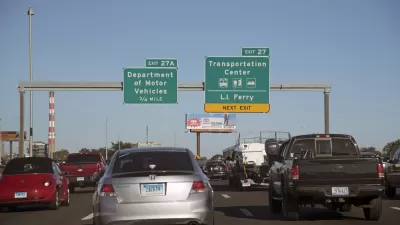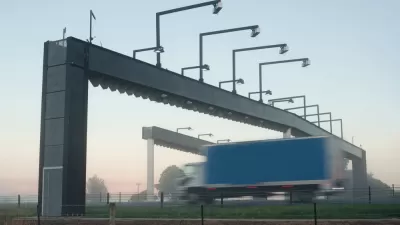New Connecticut Governor Ned Lamont has reversed the position of his campaign, when he pledged to toll only heavy trucks to tackle traffic congestion. In an op-ed, Lamont explains why all vehicles must be tolled. He also rules out a gas tax hike.

"As your governor, I cannot fix this economy without fixing our transportation system," Democratic Governor Ned Lamont states in a video on his webpage that also includes an op-ed printed in the CT Post on Saturday, Feb. 16, "A Path Forward on Tolling."
On paper, we have it all — access to world-class talent; equidistant between Boston and New York without the exceptionally high cost of living; ... [b]ut our reputation in one area, in particular, precedes us, and not in a good way. Our economic development team must be prepared to answer the question that everyone who knows anything about Connecticut will ask: “What about the congestion on your highways?”
Our proximity in mileage to New York City means nothing if it takes 90 minutes to get there from Stamford on the road, and over an hour by train. We need to not only maintain our aging transportation infrastructure, but it’s high time that we upgrade it, too.
Lamont's problem is that he campaigned in support of a program like the RhodeWorks plan in neighboring Rhode Island, which tolls only tractor-trailers. It may have helped get him elected, as posted after the midterms, "Truck Tolls Wins (Indirectly) on Election Day."
The governor describes in the op-ed why tolling both trucks and passenger vehicles is necessary.
While we are awaiting a ruling from the courts regarding truck-only tolling [ATA v. Alviti Complaint], our attorneys are pretty certain that if permitted, the tolling could only be done on specific bridges and the generated revenue would be reserved for those bridges, not for congestion pricing. Assuming our attorneys are correct, the truck-only option provides too little revenue, too slowly and too piecemeal to make a meaningful difference.
All-vehicle tolling backlash
"Critics of Lamont and opponents of tolls unleashed a firestorm on social media following Lamont’s Op-Ed," writes Connecticut Post reporter Kaitlyn Krasselt in the source article.
They showed anger over tolls — which they argue will place an unfair burden on Connecticut’s low- and middle-class commuters, and will drive business to other states — and they questioned Lamont’s integrity.
A WFSB video shows candidate Lamont pledging that he wouldn't consider all-vehicle tolling and Senate Republican leader Len Fasano opposing the proposal.
Ryan Drajewicz, Gov. Ned Lamont’s chief of staff, dispatched to address the public backlash on Sunday, explains to Krasselt why it was necessary to widen the tolling net to include passenger vehicles, which would capture $800 million annually.
Trucks-only tolling is estimated to bring in $45 million to $200 million, Drajewicz said, and the state Department of Transportation projects $500 million a year is needed just to repair bridges.
However, the truck-only option doesn't appear to have been ruled-out Lamont's 56-second video, which he ends with the governor asking, "I want you to take a look at these two options. I'd love to hear your feedback."
Gas tax hike ruled-out
Lamont writes in his op-ed:
The gasoline tax simply does not provide the reliable revenue we need, period. Gasoline tax revenues have been flat for 10 years and are expected to begin declining as cars become more efficient, and as the sales of electric vehicles increase. As such, I do not support raising the gas tax, as it is already high compared to our peers.
That's no longer the case, according to reporting by Keith M. Phaneuf and Jake Kara of the non-profit Connecticut Mirror on Feb. 1, 2018. They report on a seven-cents per gallon gas tax hike proposed by former Democratic Gov. Dan Malloy.
The American Petroleum Institute currently ranks Connecticut ninth nationally in total state fuel taxes at 39.3 cents per gallon, 5.7 cents higher than the U.S. average. [As of Jan. 1, total state gas taxes are 36.85 cents per gallon.]
In the Northeast, Connecticut ranks third, behind Pennsylvania’s 58.7 cents and New York’s 44.3 cents.
In Wisconsin, new Democratic Gov. Tony Evers wants to hike the gas tax, but the Republican legislature prefers tolls even though there's no guarantee that they would be able to secure permission from the Federal Highway Authority to place the tolls on federal highways. The same uncertainty awaits Lamont in Connecticut.
Related in Planetizen
-
Wisconsin Republicans Unite to Support Road Tolling Over Gas Tax Hike, February 11, 2019
-
Truck Tolls Wins (Indirectly) on Election Day, November 19, 2018
-
Bill to Toll Connecticut Interstates and Parkways Advances, April 12, 2018
-
Connecticut Governor's Transportation Plan Raises New Revenue to Fund Road Projects, February 2, 2018:Tolls and gas taxes—that's how Connecticut Governor Dannel P. Malloy plans on raising revenue for the state's troubled Special Transportation Fund.
-
Gas Tax Woes: A Tale of Two New England States, June 10, 2013
Hat tip to IBTTA Smart Brief.
FULL STORY: Lamont’s toll option could raise $800 million per year

Alabama: Trump Terminates Settlements for Black Communities Harmed By Raw Sewage
Trump deemed the landmark civil rights agreement “illegal DEI and environmental justice policy.”

Planetizen Federal Action Tracker
A weekly monitor of how Trump’s orders and actions are impacting planners and planning in America.

Why Should We Subsidize Public Transportation?
Many public transit agencies face financial stress due to rising costs, declining fare revenue, and declining subsidies. Transit advocates must provide a strong business case for increasing public transit funding.

Understanding Road Diets
An explainer from Momentum highlights the advantages of reducing vehicle lanes in favor of more bike, transit, and pedestrian infrastructure.

New California Law Regulates Warehouse Pollution
A new law tightens building and emissions regulations for large distribution warehouses to mitigate air pollution and traffic in surrounding communities.

Phoenix Announces Opening Date for Light Rail Extension
The South Central extension will connect South Phoenix to downtown and other major hubs starting on June 7.
Urban Design for Planners 1: Software Tools
This six-course series explores essential urban design concepts using open source software and equips planners with the tools they need to participate fully in the urban design process.
Planning for Universal Design
Learn the tools for implementing Universal Design in planning regulations.
Caltrans
Smith Gee Studio
Institute for Housing and Urban Development Studies (IHS)
City of Grandview
Harvard GSD Executive Education
Toledo-Lucas County Plan Commissions
Salt Lake City
NYU Wagner Graduate School of Public Service




























